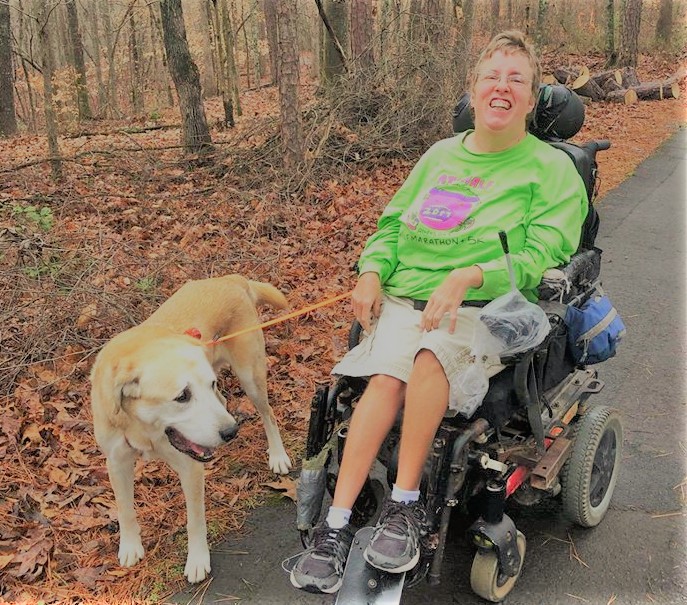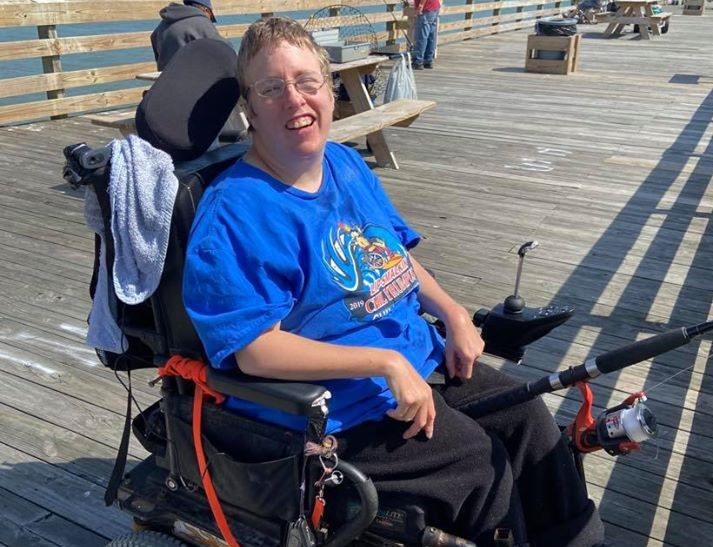The focus of this blog is to bring awareness to the empowerment of assistive technology and how it has impacted someone’s life with a disability.
Dan Schierenbeck
March 2021

Dan Schierenbeck is a 22 year old sophomore at Wright State University in Dayton, Ohio. He was majoring in computer science but like the majority of college students, he is undecided. He lives on campus where he has around the clock attendant care. Since COVID hit almost a year ago, he spent last fall at home with his parents and sister. His family has made the best of it and had to search for football games to watch on TV. In normal circumstances, he enjoys traveling to Washington, D.C. to visit his sister and going to Florida when he isn’t in school.
When Dan was 3, his parents researched assistive technologies that could help Dan since he was diagnosed with cerebral palsy, which affects his ability to control his muscles. One of his first pieces of technology was a communication device. He started with a Dynavox but found it difficult to use especially when he switched to a newer Dynavox. He expressed, “… none of my custom pages on the Dynavox would transfer to the new Dynavox.” This led him to become frustrated and he didn’t have a voice until he was in the 3rd grade. At this time, he was introduced to Minspeak on the Prentke Romich communication devices. He uses his head to activate a switch to select the icons on his communication device.
Dan also takes advantage of universal software such as Microsoft’s Ease Of Access feature. This feature has a screen reader which he uses to do research and read his assignments. Additionally, he has an Alexa and uses phrases on his communication device to give them commands such as “turn on” to control his lights in his dorm room. He also uses Siri on his iphone for assistance in answering questions while in school.
“Siri is helpful in school. Since I can’t type, I just ask Siri to look up something”
Due to the spasticity in his extremities he is not able to drive a power chair which really limits his independence. If he could use a power chair, he could control almost everything in his environment from his computer to his TV. So, he uses a manual chair that has a removable seating system from Ride Designs that positions him well, and also allows him to sit at a regular table or in a regular car seat if necessary.
Dan’s dream piece of assistive technology would be one that could read his mind.
“All of my different AT would work as a team. I would be able to think about where I wanted to go, and my chair would move and stop with my thoughts. I could call anyone through my phone, and I could just think about what I wanted to say and my device would speak it for me. I would have to be careful that my device didn’t say everything I am thinking. Hahahaha”.
Faye Warren
August 2020

Faye Warren earned her Bachelor of Fine Art Degree in English and Creative Writing from Saint Andrews University in North Carolina. She enjoys writing, working out, and going clubbing but during these months of COVID she has adjusted by shopping online. She lives independently in her own apartment and has the support of her parents. She expressed, “ My dad is a saint and my hero.”
Faye lives in Orlando, FL in her own apartment and works for Florida Diagnostic and Learning Resource(FDLR) as a consultant. in 2008, FDLR funded her as position as an assistive technology (AT) consultant to work with students who use different types of communication devices in the Orange County School District. In her role she teaches students who use AAC on how to put together sentences using their devices. She also serves as a mentor and helps students learn life skills such as: socializing, communication, self-esteem, problem solving, self-confidence. In addition, Faye gives lectures to speech-language pathology students and advises them on how to interact with their students who use AAC as well as giving suggestions on teaching methods for students with and without disabilities. In 2009, graciously took interested in her expertise and has funded her position as a vendor with similar responsibilities.
“I absolutely love making a difference in people’s lives and improving the quality of lives of people with and without disabilities” Faye expressed.
During Faye’s birth the doctor accidentally over medicated her mother which affected different parts of her brain. This resulted in her having spasctic quadriplegic cerebral palsy. With her great sense of humor, she jokes that “I am still crazy from my mom’s medication overdose”. Faye relies on assistive technology since she lacks the ability to speak and control of limbs.
When she was four years old, she began using a power chair with a joystick which she drove with her hand. Currently, she has a Permbil power chair with a head array allowing her to control her chair with her head. She loves this system! Throughout her life she has used six different Prentke Romich Company’s communication devices with Minspeak. Presently, she uses an Accent 1400 with NuPoint Head Tracking System. She describes the NuPoint as a “reflector dot that reads my head movements and when I point to a key for five seconds, it would automatically pick the key.”
She doesn’t only use her Accent for communication. It also allows her to control devices around her apartment such as TVs, DVD players, cable etc. The Accent has a camera which the dot on her glasses reflect off of light to move the pointer on her screen. She is also interested in exploring the Alexa which is another way to access her environment hands free with her communication device. It is amazing to see how specialized technology has become workable with universal devices.
Fay’s ultimate device would be
“A communication device that would read my brain waves. Therefore, I can say exactly what I want to say at that exact moment without having anybody talking over me and without getting exhausted. a
Sarah Morris

Sarah Morris lives in Cheyenne, Wyoming with her mom and sister. She attended Pasadena California College and studied math and history. Shortly after starting college, she got a freelance job as a writer with the Major Baseball League Advance Media. For over 25 years she wrote editorials about her favorite team the Los Angeles Dodgers. In 2015, she published her first novel, Revenge and is currently writing about a book about 1918 influenza flu and World War I. She currently has a blog. During her leisure time, she enjoys watching: classic movies, YouTube videos, and anything pertaining to World War II. She is an avid dog lover! Her family adopted a flat hair retriever named Colleen. Unfortunately, last October (2019) she lost her buddy Byron, a french bulldog.


“If I want to accomplish anything independently, I rely on assistive technology,” she stated.
Throughout her life she has used a variety of adaptive devices. She received her first manual wheelchair when she was seven years old, since it was required for her to ride the school bus. Before getting her wheelchair she relied on an umbrella stroller to go anywhere for mobility. When she was in her teenage years, she was elated when she was finally able to use a headstick. Her headstick gave her a great deal of new found independence. She was able to use it to type on an electric typewriter.
“I could do my classwork and homework independently.”
Currently, Sarah uses a window laptop with an eye system with an alternative and augmentative communication (AAC) software. By using the WordPower and word prediction she is able to type and communicate faster. These AAC software gives her the ability to type 10 words in a minute compared only typing one word a minute. It also cuts down on her fatigue which makes her more productive.
Another piece of assistive technology that gives her a lot of freedom is her Quickie S-63 and Quickie 2 power chair. She uses a chin joystick to control her wheelchair as well as other devices. The joystick on her power chair has built in bluetooth which allows her to control any device with bluetooth capabilities. This gives her the independence to access things such as Roku, TVs, computers.
Her ideal piece of assistive technology would be a robotic arm .
Sarah expressed if she had one,
“It would let me turn on my computer, make coffee, prepare a TV dinner, and feed myself. I could live somewhat independently.”
Tracy Rackensperger

A native Floridian Tracy Rackenspenger lives in Georgia with her dog Charlie. After obtaining her doctorate in Social Foundations of Education from the University of Georgia, she became a faculty member of the University’s Institute on Human Development and Disability Department. As a professor her responsibilities include: teaching undergraduate students, training and providing technical assistance, and preparing articles for research publication. Prior to working for the University, Tracy worked at the RERC on AAC where she conducted research and published scholarly works regarding AAC, transition and people with disabilities.
Tracy has Cerebral Palsy (CP). In layman’s terms CP affects her motor control in all four extremities, the way she talks, as well as her balance which makes standing and walking a big problem.
“You don’t overcome disability,” she notes. “You overcome society’s low expectations of people with disabilities. It’s all about attitude.”r
With the use of assistive technology she has been able to achieve her goals, fulfill her dreams, and aspirations. She remembers her Touch Talk communication device and power chair were her first pieces of assistive technology devices. “The Touch Talker gave her the ability to communicate with people outside of immediate family,” stated Tracy.

Currently she uses an array of assistive technology for social media, work, and communication. By using a Google Tablet she is able to manage all of her social media and give lectures. Although she expressed that one of the drawbacks of the tablet isn’t great for spontaneous communication and often has to use her ECO with Unity. At work she uses intellikeys, to navigate her computer. “ Very old technology for keyboard access, but still works great!” Tracy expressed.
Like most people with disabilities, duct tape is one of her closest friends. She likes to drink out of squirt bottle but has problems holding them. Over the years, she has modified many bottles by duct taping jogger handles on them. This gives her a bigger grasp to hold onto. Another clever idea she developed to help her eat was to make a regular fork into a two prong fork. She would then wrap duct tape around the handle to make it slightly bigger.
Tracy loves the outdoors and enjoys: kayaking/canoeing/paddle boarding, water and snow skiing, going to the beach, fishing, etc.She uses a variety of adaptive equipment to assist with these activities. In order for her to sit up in her boating activities, she sits on a low beach chair. For water skiing she uses the Sit-Ski and the Unique Bi-Ski to snow ski. Tracy lives close to the beach so has access to a beach wheelchair through the city of Myrtle Beach which provides free rentals.

“ I am in my happy place when I am fishing, when it’s just me and my fishing gear”
Watch Tracy’s active life